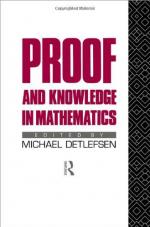|
This section contains 1,641 words (approx. 6 pages at 300 words per page) |

|
Background: Mathematics Becomes the Language of Scientific, Philosophical, and Cultural Revolution
During the nineteenth century advances in mathematics pointed toward a universe not necessarily limited to three dimensions and not necessarily absolute in time and space. By developing new mathematical models and precise formulas with enormous predictive power, mathematicians profoundly shaped the understanding and application of twentieth-century relativity and quantum theories. In many cases, innovative mathematical models became the only means to describe profoundly revolutionary scientific and philosophical concepts regarding the structure and workings of nature.
Throughout the twentieth century there was a steady pace to the refinement and discovery of new applications for mathematical principles. In particular, advancements in differential equations (equations that relate the rates of change of physical quantities to the values of those quantities themselves) found continued application in astronomy and physics. Mathematicians and physicists labored to find mathematical formulas...
|
This section contains 1,641 words (approx. 6 pages at 300 words per page) |

|


